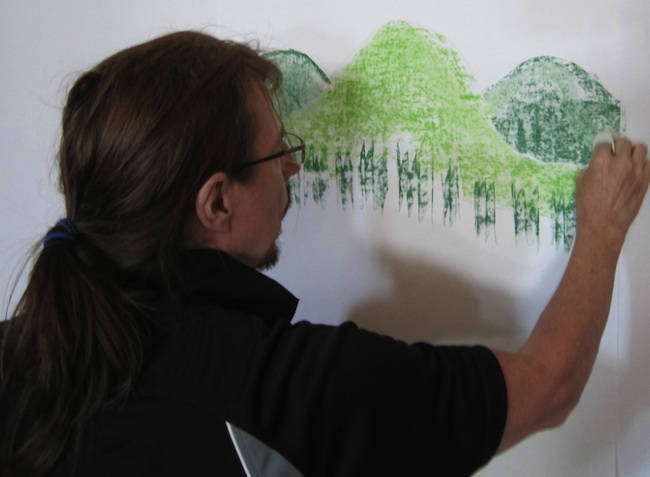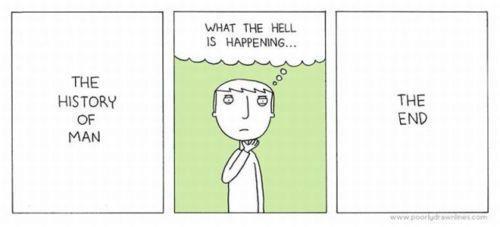A portrait of the old man as an artist (me, taken by Nancy White)
Since I began keeping this blog nearly 10 years ago, its audience has gradually shifted as my posts have become less frequent, more pessimistic, less business-oriented, and longer. At the same time, I’ve noticed that my face-to-face conversations about the subjects I’ve been writing about have become rarer. Most of my personal contacts — people I know in the community, friends, relatives, and project collaborators — are at least somewhat aware of my worldview, but we rarely talk about it. My grief for Gaia’s suffering and dread about the future is like a ghost: It follows me everywhere, but is rarely noticed by others, or if it is, it’s consciously ignored.
I no longer self-censor — I’m very candid about what I’ve learned and what I believe — but somehow the subject rarely comes up, and when it does, the conversation quickly moves on. For each of us there seems no point trying to persuade the other to believe what they are not ready to believe, so we talk about other things.
Because I no longer believe there’s anything we should or can do to prevent or mitigate collapse, and am content just to live life joyfully every day, that’s fine with me; I’m not an evangelist. But I sense that for others there is a sense of sadness that they can’t persuade me to join their particular modestly world-changing project. This is especially true of progressive-minded and Transition colleagues. Yet there is rarely a judgement attached to this sadness; my eccentric views are respected, and accepted.
Most of the time, though, we’re just silent about it. In fact, the time I spend with others is, more and more, time spent in silence.
I know some client scientists who, likewise, don’t talk much anymore. They know that if they say what they really believe, they will lose their audience, and perhaps their jobs. [Thanks to Tim Bennett for the link.]
There is much to be said for silence.
PREPARING FOR CIVILIZATION’S COLLAPSE
The history of man, from poorlydrawnlines. Thanks to David Hodgson for the link.
Resilience 101: Wonderful, practical advice on making your home and life resilient to energy, ecological and economic crises from Nicole Foss (Stoneleigh) at The Automatic Earth. Thanks to Seb Paquet for the link.
Climate Change, Denial, and Economic Collapse: Morris Berman dissects an article by Naomi Klein in which she says “It is not opposition to the scientific facts of climate change that drives denialists but rather opposition to the real-world implications of those facts.” She says the right realizes that acceptance of climate change as a fact means accepting the failure of capitalism and the need for an alternative, egalitarian, non-competitive, regulated, collectivist economy — the right’s worst nightmare. Not surprising, then, that US (and British) conservatives have been powerfully swayed by recent (expansive and expensive) propaganda denying climate change is real. Naomi’s article goes on to list 6 steps to a “new paradigm” of economic thinking. “I found myself writing ‘good luck’ in the margins of much of this discussion”, Morris writes, and I think he’s right. He goes on:
In terms of recommendations, then, Klein’s essay is rather weak. But it offers something very important by way of analysis, and also by implication: Everything is related to everything else. Psychology, the economy, the environmental crisis, our daily mode of living, the dumbing down of America, the pathetic fetish over cell phones and electronic gadgets, the crushing debt of student loans, the farce of electoral politics, Mr. Obama’s rather rapid conversion from liberal hero to war criminal and shredder of the Bill of Rights, the huge popularity of violent movies, the attempt of the rich to impose austerity measures on the poor, the well-documented epidemics of mental illness and obesity—these are ultimately not separate spheres of human activity. They are interconnected, and this means that things will not get fixed piecemeal. “New civilizational paradigm” means it’s all or nothing; there really is no in-between…
The scale of change required cannot happen without a massive implosion of the current system…[But] the basic demand [of the Occupy movement] was that the pie be cut up more fairly. I never had the impression that the protesters were saying that the pie, in toto,was rotten… [And] a recent poll by the Pew Charitable Trust revealed that most Americans have no problem at all with the existence of a small wealthy class; they just want to be able to join it…
The biologist David Ehrenfeld writes: “Our first task is to create a shadow economic, social, and even technological structure that will be ready to take over as the existing system fails.” … [My colleague Joel Magnusson argues] we need concrete models of a post-carbon economy, ones that break with the profit model of capitalism—and not in cosmetic or rhetorical ways… My guess is that “dual process”—the disintegration of capitalism and the concomitant emergence of an alternative socioeconomic formation—is going to be the central story of the rest of this century.
(Thanks to David Hodgson for the link, and the one that follows.)
How Seized-Up Supply Chains Collapse the Economic System: Great piece of writing about complexity and how we’ve made our supply chains so interconnected and “efficient” (i.e. complicated) they have made us hugely vulnerable.
US Empire is Over: Chris Hedges, in a long (3-hour) interview, says he believes Occupy or a movement like it will ultimately bring about the overthrow of the right-wing establishment that controls both parties in the US, and blames the left’s complacency for allowing that control in the first place. Thanks to Seb Paquet for the link. Also from Chris Hedges, an explanation of why growth is the problem, not the solution.
Derrick Jensen’s Self-Evident Truths: Derrick, in Orion magazine, writes up a list of demands for political reform. Even if they were accepted, they would not work; there is so much invested in the status quo that those motivated to keep it going would find workarounds to Derrick’s new political order. Things are the way they are for a reason. But it’s a good list — the idealist in me was smiling.
No One Is In Control: Philosopher Zygmunt Bauman explains why most of us are afraid to acknowledge that no one is in control of our teetering civilization.
The Economic/Ecological/Energy Crises Explained: A great animation from Australia’s DoingItOurselves explains the basis for and interrelationships among the three “E” crises. It ends on a note of optimism I don’t share, but what they’ve jammed into 12 minutes is awesome — appropriate to send to all the people you know who still don’t get it.
New Economies Evolve As the Old One Collapses: Collapsing economies have lessons for those of us whose economies are still stumbling along. In riot-torn Spain where austerity has forced many low-wage earners to seek food in dumpsters, some have created pieces of a new community-based economy to replace the failing Euro-based one. Thanks to Luis Suarez for the link. And here’s a good summary of the whole ‘New Economy’ movement from Gar Alperovitz.
LIVING SMARTER
School bus converted into an off-the-grid home; original source unknown
The Freedom to Learn: An oldie (2007) from Gustavo Esteva explains the basis of unschooling and how it’s been applied to replace traditional schooling in Zapatista country. Thanks to David Hodgson for the link.
Asking the Right Questions: Some additional evidence that asking important questions is a learnable skill different from and at least as important as critical and creative thinking. Thanks to Sandy Heierbacher for the link.
Another Reason to Go Vegan: New research suggests that our guts are designed for a vegan diet, and have been for 30 million years. There’s a reason we have neither fangs nor claws.
The Real Reasons to Go Organic: If you were at all swayed by the agribusiness-subsidized ‘study’ that claimed organic was “no better” than “conventional” (GMO, pesticide-laced, chemical-soaked, hormone-altering) food, this analysis will set you right.
POLITICS AND ECONOMICS AS USUAL
1933 cartoon by New Yorker cartoonist Syd Hoff (using the pen name A. Redfield in the Daily Worker), from Bob Mankoff’s New Yorker cartoon newsletter
The Ghost Cities of China: In a desperate effort to create growth at any cost, China is adding a new coal-powered energy generating plant every four days, and exhausting water and other critically-scarce resources. To do what? Build dozens of cities (and universities) to house (and teach) millions of people — 64 million of them empty, because no one can afford them, and many of them already crumbling from neglect and disuse. Here’s a video.
Brasil Gives Up Trying to Save the Rainforest: Ceding to political pressure for rapid industrial growth and cost cuts, and realizing that corruption and desperation are so rampant in Brasil that trying to enforce environmental laws is hopeless, the country’s president has devolved enforcement responsibility to local authorities with no resources or capacity, and halved its enforcement team.
Life Expectancy For Poor US Whites Drops to Third World Levels: The rich/poor gap in the US is becoming a chasm, as the combination of poor diet, lack of medical access and stress means poor Americans now die an average of 12 years younger than the rich.
Electricity’s Thirst for Water: “Virtually all power plants, whether they are nuclear, coal, or natural gas-fired, are completely dependent on water for cooling. Hydroelectric plants require continuous water flow to operate their turbines. Given the drought, many facilities are overheating and utilities are shutting them down or running their plants at lower capacity. Few Americans know (or up to this point have cared) that the country’s power plants account for about half of all the water used in the United States. For every gallon of residential water used in the average U.S. household, five [gallons] is [consumed] to provide that home with electricity via hydropower turbines and fossil fuel power plants, roughly 40,000 gallons each month [per household].” Thanks to Sue Bulloch for the link.
Too Big to Permit: Gar Alperovitz argues that the banks too large to regulate should be nationalized, broken up, repurposed and relocalized.
Profits Up, Wages Down: Except for wages of those at the top of course. “Our current system and philosophy is creating a country of a few million overlords and 300+ million serfs.” Thanks to Luis Suarez for the link.
India’s Dreaded Stray Dogs: Tens of millions of starving, desperate, often rabid feral dogs in India’s city streets bite millions and cause 20,000 rabies deaths per year.
FUN AND INSPIRATION
“now” clock; thanks to Ryan Stones for the link
Several Short Sentences About Writing: NYT nature writer Verlyn Klinkenborg encourages us to ignore everything we’re told about writing and authorize ourselves. Absolutely outstanding article.
Where Indo-European Languages Began: Latest research suggests our language family started in Anatolia (now Turkey), and it emerged with, and moved with, learnings about, you guessed it — agriculture.
Somebody (Else) That I Used to Know: In my March 2012 Links of the Month I wrote: “Watch these three videos in this order: (1) Pop song Somebody That I Used to Know by Gotye and Kimbra. Starts kinda slow but music gets interesting later and the video is clever. (2) Now watch this even cleverer cover version by Toronto indy group Walk Off the Earth. Note the number of views. Good harmonies too. (3) Finally, watch this take-off on the cover version. Fall-down funny.” Six months later, inevitably, there’s a part (4) and here it is: Gotye’s own mashup of all the cover versions, good and bad, of his original song. Thanks to Seb Paquet for the link.
Pure Pacific Northwest: Amazing time lapse photography of the left coast from John Eklund.
Conformity: A review of studies of how a group influences its members’ perceptions and hence their judgements. Thanks to Dale Asberry for the link.
Mad World: Gary Jules’ famous cover of Tears for Fears’ hit song; moving song, astonishing video.
Chomsky on the Limits to Understanding: Noam Chomsky argues that science will never be able to fully understand or explain the real world, and we should stop trying to reduce the complex (brains) to the complicated (computers). Thanks to Michael Nenonen for the link.
Rufus Tower: A man shows affection for his cat by building him an awesome, huge playhouse. Thanks to Tim Bennett for the link.
A 1987 View of 2012: A group of sci-fi writers and scientists created a time capsule in 1987 with their predictions for what life would be like in 2012. They got it mostly wrong, but were occasionally prescient.
Proof Cats Are Better Than Dogs: A very silly video.
The World’s Biggest Cartoon: Fascinating and brilliantly designed, but you’ll need about an hour to click and drag through it all. Thanks to Bruce Campbell for the link.
Autism Caused by Mother’s Hyperactive Immune System in Utero?: I’ve written a lot about the skyrocketing epidemic of hundreds of immune hyperactivity (chronic inflammatory) diseases in Western society, due probably to food toxins, excess antibiotic use and stress. Now a study suggests that the explosion of autism in the same nations may be due to damage caused by the mother’s hyperactive immune system during pregnancy.
THOUGHTS OF THE MONTH
Comic from the amazing Incidental Comics
From Carl Sagan in The Demon Haunted World (thanks to Sam Rose for the link):
I have a foreboding of an America in my children’s or grandchildren’s time– when we’re a service and information economy; when nearly all the key manufacturing industries have slipped away to other countries; when awesome technological powers are in the hands of a very few, and no one representing the public interest can even grasp the issues; when people have lost the ability to set their own agendas or knowledgeably question those in authority; when, clutching our crystals and consulting our horoscopes, our critical faculties in decline, unable to distinguish between what feels good and what’s true, we slide, almost without noticing, back into superstition.
From the New American Movement’s 1971 broadsheet — how times (don’t) change (thanks to Stephen Downes and Luis Suarez for the link):
If you’re unemployed it’s not because there isn’t any work – Just look around: a housing shortage, crime, pollution; we need better schools and parks. Whatever our needs, they all require work. And as long as we have unsatisfied needs, there is work to be done. So ask yourself, what kind of world has work, but no jobs. It’s a world where work is not related to satisfying our needs, a world where work is only related to satisfying the profit needs of business. This country was not built by the huge corporations or government bureaucracies. It was built by people who work. And it’s working people who should control the work to be done.
On voting for the “lesser of two evils”:
Alice Walker’s new poem “Democratic Womanism“
Lian’s A Pessimist’s View of the 2012 Election (thanks to reader “Sue” for the link)
From William E. Stafford (thanks to Tim Bennett for the link):
A MESSAGE FROM THE WANDERER
Today outside your prison I stand
and rattle my walking stick: Prisoners, listen;
you have relatives outside. And there are
thousands of ways to escape.
Years ago I bent my skill to keep my
cell locked, had chains smuggled to me in pies,
and shouted my plans to jailers;
but always new plans occured to me,
or the new heavy locks bent hinges off,
or some stupid jailer would forget
and leave the keys.
Inside, I dreamed of constellations—
those feeding creatures outlined by stars,
their skeletons a darkness between jewels,
heroes that exist only where they are not.
Thus freedom always came nibbling my thought,
just as—often, in light, on the open hills—
you can pass an antelope and not know
and look back, and then—even before you see—
there is something wrong about the grass.
And then you see.
That’s the way everything in the world is waiting.
Now—these few more words, and then I’m
gone: Tell everyone just to remember
their names, and remind others, later, when we
find each other. Tell the little ones
to cry and then go to sleep, curled up
where they can. And if any of us get lost,
if any of us cannot come all the way—
remember: there will come a time when
all we have said and all we have hoped
will be all right.
There will be that form in the grass.











Pingback: Conformity and consensus | rhizome
Ancient humans used complex hunting techniques to ambush and kill antelopes, gazelles, wildebeest and other large animals at least two million years ago. The discovery – made by anthropologist Professor Henry Bunn of Wisconsin University – pushes back the definitive date for the beginning of systematic human hunting by hundreds of thousands of years.
Two million years ago, our human ancestors were small-brained apemen and in the past many scientists have assumed the meat they ate had been gathered from animals that had died from natural causes or had been left behind by lions, leopards and other carnivores.
But Bunn argues that our apemen ancestors, although primitive and fairly puny, were capable of ambushing herds of large animals after carefully selecting individuals for slaughter. The appearance of this skill so early in our evolutionary past has key implications for the development of human intellect.
http://www.guardian.co.uk/science/2012/sep/23/human-hunting-evolution-2million-years
I’m not sure if you’re pessimistic or realistic Dave. I think what is typical is for people to be a bit more positive, but one could argue that it might be an emotional tendency that masks seeing what is actually there. I think you’ve said all that before though, my comment is more of a nod of agreement.
The empty chinese cities were interesting though. Central economic planning at its best by omnipotent government people… I’m sure there’s an interesting idea for a story in there somewhere.
Hello there,
I just wanted to comment on the “modestly world-changing project(s)” you mention.
The thing is, if I was 20 years younger, and knew and understood what I know and understand now, I would be like you ” content just to live life joyfully every day”. I would realise this is too big and too serious and inevitable and would just live life anyway.
But children happened in the meantime. And with them a deep responsibility for others, those behind me and all around me ensued. This is the driving force behind the need for action and all the modestly world changing projects- it is not about oneself anymore, it is a mix of guilt, legacy, duty, fear and ownership. That’s why you can’t help trying to change it, it is simply not allowed. But still, we know and understand the facts and acknowledge the depressing conclusions.
Just occasionally want you to know I am thinking about you. It’s lonely, adrift, and frightening. But it is comforting to know others feel the joy and pain and keep on writing, living, playing, loving, and breathing. Have decided to vote the Green Party here in the U.S. this year, much to the chagrin of my Democrat pals. They say such a vote is meaningless. So it is. But the action has meaning for me and that’s enough.
Enjoy